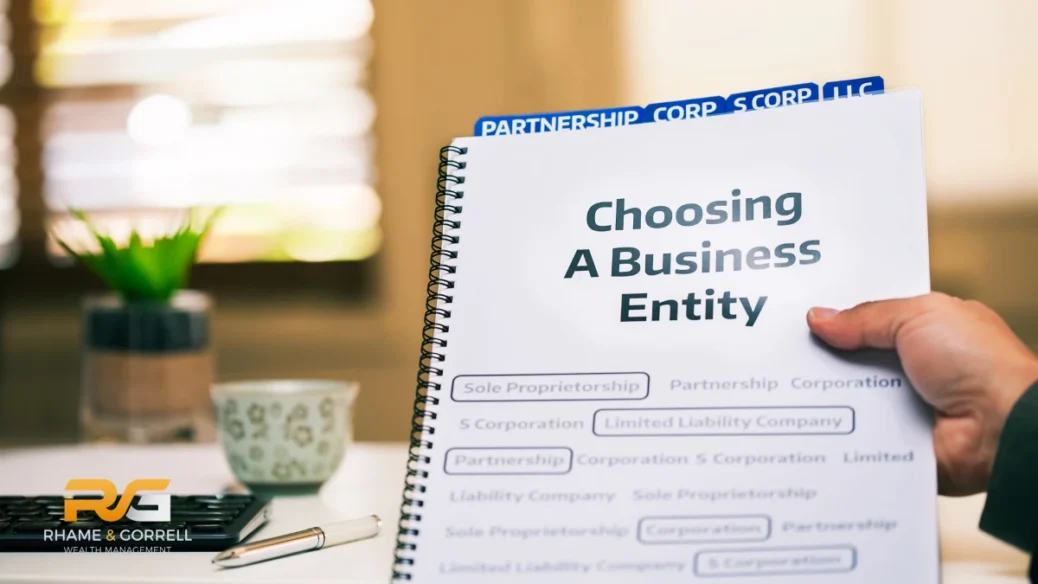Business Entities: What Is The Right Structure For You?
A Guide to Understanding The Best Option For Your Small business
As you progress through your career, the opportunity might present itself to venture out and start your own business. Whether this is to explore a new passion, or simply bridge the gap to retirement, starting a small business can provide many personal and financial benefits.
This new self-employment opportunity can be exciting but selecting the correct entity and tax structure can be a complicated process. Some individuals do not even think about these structures until it is too late. We hope to break down the difference in entity and tax structures so that you can set your small business up for success and keep every hard-earned dollar you make.
Entity Structures
Entity structure refers to the legal entity under which you operate your business. When selecting entity structure, you will want to consider what level of personal liability that you are open to. If you are the lone employee of your small business, you have three main entity structures available to you: Sole Proprietorship, Limited Liability Company (LLC), or Corporation (C Corporation or S Corporation).
In certain unique situations, a partnership can be a good option. However, for the purpose of this article, we will not be discussing partnerships.
Sole Proprietorship
A business owned and operated by one individual. This is the most simple and least expensive form of business entity, but the owner is personally liable for all debts and obligations of the business. A way to mitigate legal liability in this structure is through the use of insurance policies.
Limited Liability Company (LLC)
A hybrid entity that combines the liability protection of a corporation with the tax benefits and operational flexibility of a partnership. LLCs are the most popular form of business entity in Texas. Under what is called a “Single Member LLC” you are allowed to be the only owner/partner in the LLC and elect to be taxed as either a Corporation or Sole Proprietorship.
Corporation
A legal entity that is separate from its owners, providing personal liability protection to shareholders. Corporations can be classified as either C Corporations or S Corporations. S Corporations operate in very similar fashion on the legal side as C Corporations but certain tax advantages as well as strict rules pertaining to who can be a shareholder.
Once you select the appropriate entity structure, you will be able to register for your small business through the office of the Secretary of State.
In many cases, you will also need to obtain a separate Employer Identification Number (EIN) to further separate yourself from the business (for liability and tax purposes). This can be done by mailing the EIN application forms to the IRS or completing the forms on the IRS website (the IRS offers this service for free, so please be sure you go through the IRS website as other websites might try to make you pay to receive your EIN).

Tax Structures
Once your business entity is fully set up, the issue of taxation arises. There are two main ways in which to treat your business for tax purposes: on an individual’s Schedule C, or as a flow-through entity. Below we will go into the benefits of each as well as which option applies to each entity structure.
Filing through your Schedule C
When you file taxes on Schedule C, you are reporting the income and expenses of your business as a sole proprietor or LLC. This means that the profits or losses of your business are treated as yours and taxed at your individual tax rate.
Additionally, as a sole proprietor or LLC, you are responsible for paying self-employment taxes on your business income. This method is the most simple to set up and operate, but it also has its limits on expense deductions and retirement plan contributions.
Filing as a flow-through entity (Form 1120-S)
When you operate as a flow-through entity, the profits and losses of the business “flow-through” to the individual owners and are reported on their personal tax returns. This means that the income is only taxed once at the individual level, rather than being taxed twice (once at the business level and again at the individual level) as is the case with a C Corporation. While flow-through entities are not subject to federal income tax at the entity level, they may still be subject to state income taxes and other taxes, depending on where the business operates.
LLCs and S Corporations are allowed to elect this flow-through tax status and it has many benefits, especially if your business in generating substantial profits. This entity structure will also allow you to put more into retirement accounts and take certain expense deductions not available on the Schedule C.
When your business is taxed as an S Corporation, you are also required by the IRS to pay yourself a “reasonable salary”. This salary is important as it is used to calculate retirement contributions and requires certain forms to be filed such as a W-2 and 940s/941s. Unfortunately, the IRS does not define what they deem as a “reasonable salary”, but most accountants have settled on 20% – 35% of the businesses net income for the year.
The decision to operate as a flow-through entity should be based on a variety of factors, including your business goals, liability considerations, and tax situation. It’s important to consult with a tax professional or accountant to determine the best tax structure for your business.
We here at Rhame and Gorrell Wealth Management have two experienced CPAs on staff that would love to discuss what structure is best for your small business to allow you to achieve your retirement and business goals. Our CFP® Professionals and CPA tax experts have years of experience guiding our clients through life’s tough questions and would be happy to answer any of your questions as well as sit down with you to compile a complimentary comprehensive tax and financial plan.
Need Some Help?
If you’d like some help from one of our CPAs or CERTIFIED FINANCIAL PLANNER (CFP®) advisors regarding this strategy and how it applies to you, the Rhame & Gorrell Wealth Management team is here to help.
Our experienced Wealth Managers facilitate our entire suite of services including financial planning, investment management, tax optimization, estate planning, and more to our valued clients.
Feel free to contact us at (832) 789-1100, [email protected], or click the button below to schedule your complimentary consultation today.
IMPORTANT DISCLOSURES:
Corporate benefits may change at any point in time. Be sure to consult with human resources and review Summary Plan Description(s) before implementing any strategy discussed herein.Rhame & Gorrell Wealth Management, LLC (“RGWM”) is an SEC registered investment adviser with its principal place of business in the State of Texas. Registration as an investment adviser is not an endorsement by securities regulators and does not imply that RGWM has attained a certain level of skill, training, or ability. This material has been prepared for informational purposes only, and is not intended to provide, and should not be relied on for, tax, legal or accounting advice. You should consult your own CPA or tax professional before engaging in any transaction. The effectiveness of any of the strategies described will depend on your individual situation and should not be construed as personalized investment advice. Past performance may not be indicative of future results and does not guarantee future positive returns.
For additional information about RGWM, including fees and services, send for our Firm Disclosure Brochures as set forth on Form ADV Part 2A and Part 3 by contacting the Firm directly. You can also access our Firm Brochures at www.adviserinfo.sec.gov. Please read the disclosure brochures carefully before you invest or send money.












